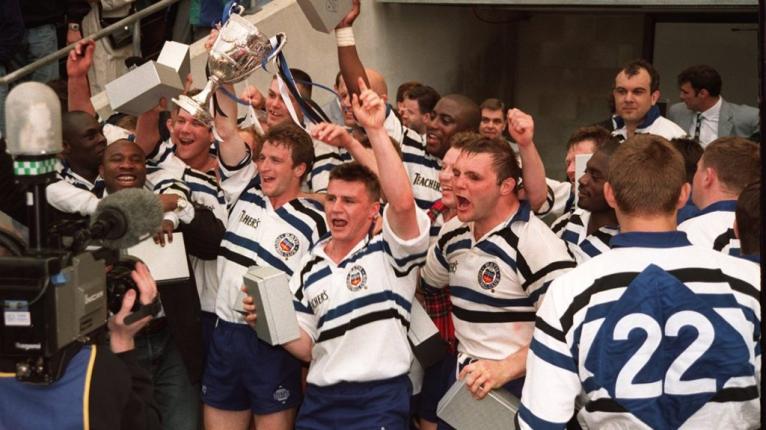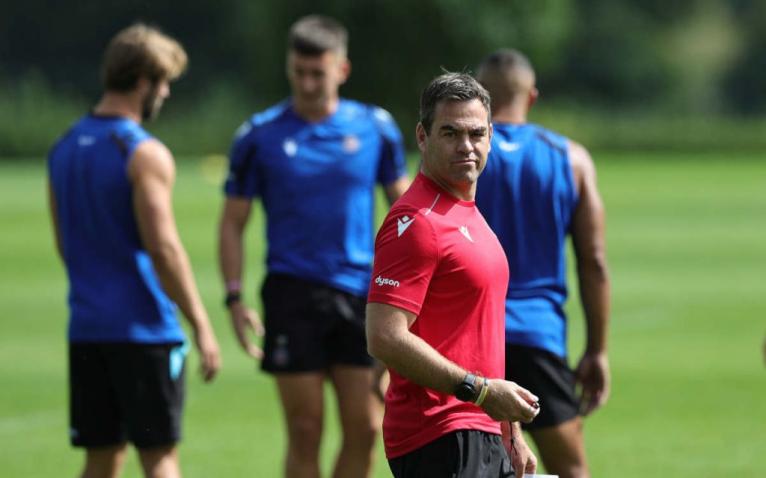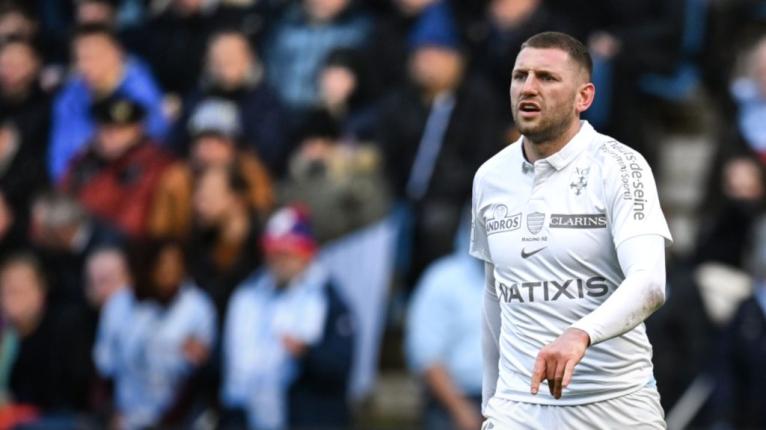There are, as the saying goes, a million reasons Finn Russell might have chosen to join Bath, why the marvellous Scotland play-maker is leaving the blockbuster backdrop and Globetrotter Galacticos of Paris for the quaint and picturesque West County locale.
That widely reported seven-figure contract is a whopper, all right. In the current market, as Premiership clubs grapple with a constricted salary cap and belts tighten across the game, it is the equivalent of a winning lottery ticket. It makes Russell one of the highest-paid rugby players of all time. At 30 years old, and with a newborn child, it is an offer he could scarcely refuse. Even a player as talented and coveted as Russell would be foolish to balk at such a deal. Particularly a player who was once a stonemason earning a modest keep.
While many of their rivals are scrabbling for change between the sofa cushions, Bath remain a moneyed club. Even so, amid an economic maelstrom, Russell’s acquisition on what is believed to be an initial two-year term represents a staggering outlay.
Bath, their wealthy backers and their vast fan base, yearn for success like a child waiting for Christmas. For too long, this mighty English giant has floundered. Destined, seemingly, to exist as Liverpool did before Jurgen Klopp arrived, lusting for the glory of the past and a halcyon era when they won the lot. Between 1989 and 1998, Bath never finished outside the top three of England’s premier tier. They won six titles and a Heineken Cup in that period and were domestic runners-up twice. They have not scaled such heights since. Their last league triumph came in 1996; their most recent final appearance in 2015, the same year Russell was piloting a fabulous Glasgow side’s route to the Pro12 crown.

In the seven seasons since, Bath have reached the play-offs once, two years ago, when they were soundly beaten by Exeter. There was a degree of fortune involved too, since a covid outbreak deprived Sale of the chance to play their final match, at home to Worcester. Win, and it would have been the Sharks, not Bath, heading to Sandy Park.
Last season, Bath reached a grim nadir. Dead last in the league. Eighteen losses and thirty-two table points from twenty-three matches. They won the fewest games – five – scored the joint-fewest tries – 57 – earned the joint-fewest try bonus points – four – and scored the third-fewest points – 461. Sixty points separated them from runaway league winners and eventual champions, Leicester Tigers. They were 29 short of the top eight and the Champions Cup, and 41 adrift of a berth in the play-off positions. A yawning chasm.
Bath have always had the weaponry, but there have been too many underperforming stars these past few years. Too many go-to men on the sidelines. Too much rumour and rancour and confusion over recruitment. Allegations that Stuart Hooper was being undermined as director of rugby. Hooper has since been moved sideways to a general manager position.
On the face of it, they’re a curious mix, the gilded, playful Scot and the meticulous, deliberate South African.
In his place, Johann van Graan fetched up from Munster. The staunch rugby folk of the province were practically cheering him on to the plane, hungry for a change to the turgid fare routinely served up on his watch.
Van Graan sought to solidify Bath’s awful defence and instil a cannier kicking game before he begun to add attacking gears. After a wobbly start, they have found their feet, with wins over Northampton, Newcastle and Leicester, and a narrow loss to Harlequins, from their past four league matches. Van Graan has been aided, too, by the brutal demise of Worcester and Wasps, allowing Bath to capture prime talents such as Ted Hill, Alfie Barbeary and Ollie Lawrence.
On the face of it, they’re a curious mix, the gilded, playful Scot and the meticulous, deliberate South African. Already, there are dissenting voices, anxiety that Russell’s natural flair jars with Van Graan’s pragmatic blueprint.
Here’s the thing, though. Look at the Bath pack behind which Russell will play next season, and ask yourself whether the fly-half will ever have been armed with such an attacking platform. Even at Racing, home of the mega-stars, the forwards tend to be nimble and explosive rather than enormous and stout.

Bath are expected to tie up a deal for Thomas du Toit, the gargantuan Springbok, in the coming days. Du Toit is a colossal set-piece presence who can scrummage on either side and operate well around the paddock.
Even supposing he doesn’t sign, Bath can still field a front-row of Beno Obano, Tom Dunn, and Will Stuart. Van Graan can choose two from Charlie Ewels, Josh McNally and Dave Attwood at second-row. Ted Hill, Sam Underhill and Alfie Barbeary form a ferocious back-row trident, with Chris Cloete and Miles Reid two snarling alternatives. That’s a pack big enough and mean enough to mix it with any in the Premiership. Russell has never had such a luxury.
Then run the gamut of attacking options outside him, and you start to get really excited. His Scotland pal, Cam Redpath, and the game-changing recent addition of Lawrence, in the centres. Big Joe Cokanasiga, Ruaridh McConnochie and Tom de Glanville in the back-three. We haven’t mentioned Max Ojomoh and Will Muir, terrific players both, or Piers Francis, another midfield option. In Russell, young pivots Orlando Bailey and George Worboys have a brilliant figure to learn from.
For all Russell’s dazzling excellence, all the highlight reel moments and all the retweets and all the bottom jaws he has sent thudding to the floor, his CV lacks the most precious commodity of all: silverware.
This will be the biggest move of Russell’s career. These are his peak years, and he has opted to spend them at an English juggernaut on a quest to escape the doldrums. The player and the club, the million-pound man and the fallen giant, need each other. Russell needs Bath to cement his legacy as a true great of the modern game. Bath need Russell to haul themselves up the greasy Premiership pole. Take them back to the promised land, and he’s a hero.
Because for all Russell’s dazzling excellence, all the highlight reel moments and all the retweets and all the bottom jaws he has sent thudding to the floor, his CV lacks the most precious commodity of all: silverware. Russell’s personal trophy cabinet is a meagre reflection of his talent.
He has been part of seismic days in a Glasgow and Scotland jersey, no doubt. That 2015 Pro12 title and stunning European displays; three Calcutta Cup victories; hoodoo-smashing wins in Wales and France. He took Racing to within a game of the biggest prize of all, the Champions Cup. But in four-and-a-half years in Paris, trophies have eluded him. Racing have not made the Top 14 final with Russell at the helm. They sit second in the league, but after wounding losses to Leinster and Harlequins, their chances of Russell claiming the European gong in his farewell campaign are scant.
We should never look back at a career such as Russell’s and wonder what might have been. Nobody doubts the breadth of his skills or the size of his cojones, but other areas have been questioned. The Scotland camp wanted him to work harder. His time in France taught him to spam the gamble button less frequently, to manage a game with greater shrewdness, and to hugely reduce his capacity to self-destruct.

Russell has never looked much like an elite rugby player. You wouldn’t marvel at his biceps if he sauntered past you on Buchanan Street. Part of his charm is his relatability, his ‘normal’ appearance in a sport which has increasingly become the domain of physical freaks.
Since bringing him back into the international fold midway through the autumn, the Scotland coaches have noticed a positive change in Russell. He has torched six kilos since last season and his work rate has shot up. His demeanour gave some the false impression he had a cavalier attitude to playing for his country, when the reality could not be more different. Even so, there is a greater steel to Russell now. A steel that has come with age and growth and the knowledge that he needs to fulfil his burgeoning greatness.
The money on offer at Bath is life-altering. The glory Russell and his new employers seek would be defining.


Comments
Join free and tell us what you really think!
Sign up for free